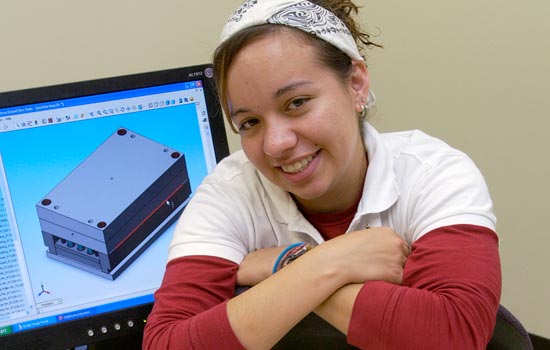NTID student engineers a promising future
A. Sue Weisler | photographer
Jasmine Oregel surprised her parents when she announced she wanted to study engineering and computer-aided drafting. And she proved to her classmates that girls could do just as well as boys could. She’ll graduate this spring with an associate degree and plans to pursue a bachelor’s degree in packaging science or mechanical engineering.
“Failure is impossible!” That famous quote from Susan B. Anthony is what inspires Jasmine Oregel to achieve her goals. “I want to be successful,” she says. And she’s well on her way.
Born in California, her family moved to Mexico before returning back to California when she was 3 years old. Her parents felt their five children would have better opportunities in the United States, especially for the three siblings, including Jasmine, who were deaf.
Now 22, Oregel is about to graduate from RIT/NTID with an associate degree in computer-aided drafting technology. Oregel says she always loved math but never thought about a career as a child in Santa Ana, Calif.
When she was a senior in high school, Oregel watched a television show featuring a 14-year-old girl who was working as an engineer helping construct buildings. “I said, ‘Wow, that girl can do that already? She’s only 14. I want that,’” Oregel says. She told her father she wanted to go to college and become an engineer. “My dad laughed at me. I told him, ‘I can,’” she says. Her close-knit family didn’t want her to go to school so far from home, but Oregel secretly applied to RIT/NTID and was accepted.
To help pay for college, Oregel received a scholarship from the Max Factor Family Foundation, which helps underserved students in the Los Angeles area to go to college. She became the first in her family to go to college out of state.
But once school began, she found herself struggling in class. “It was hard for me.” To compound matters, she says the other students in her class—six boys—thought they were better than the girls. Oregel eventually considered dropping out of her manufacturing computer-aided drafting class. “In the beginning, it was a struggle for her,” says her teacher, Marcus Holmes, a lecturer in the engineering studies program. But Oregel credits Holmes for encouraging her to continue. “I saw the potential in her,” Holmes says. “I told her if she had a goal, to go for it. And the more she would study and persist, the better she will become. So she started seeing me more and asking questions and participating more in class.”
Oregel’s class projects included designing a machine gun, a bicycle and an automation machine, complete with conveyor belt and robot arm. “She worked to become the strongest student in the whole class,” Holmes says. “When I asked a question, she always would be the first hand up. I told her to give other people a chance. She came a long way and fought her way up. I think she has a bright future. She’s ready for the working environment and she has the skills and knowledge for the job.” And, Holmes says, he knows she is a good role model for other girls wanting to join the male-dominated field of engineering.
Oregel plans to pursue her bachelor’s degree in packaging science or mechanical engineering; her dream job would be working for an automotive manufacturer in California or Hawaii.
Oregel belongs to the Alpha Sigma Theta sorority, where she served as vice president. And she enjoys playing softball, basketball and paintball and going shopping. She still misses her family in California, but keeps in contact with them daily via video phone. And the attitude among her peers in class has changed. “A lot of the boys have respect for me now,” she says.









